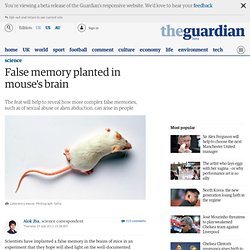

Thanks annie BPS Research Digest: Why do people like listening to sad music when they're feeling down? We spend most of our lives trying to be happy.

And yet when we're feeling sad we put on a tear-jerker tune and wallow in our misery. Why? It's an aspect of the psychology of music that's been surprisingly overlooked. Now Annemieke Van den Tol and Jane Edwards at the University of Limerick have surveyed 65 adults online about a time they'd had a negative experience and then chose to listen to a sad piece of music. Most of the participants were Irish but there were also respondents in the Netherlands, USA, Germany and Spain. Because this issue has hardly been investigated before, the researchers opted for a qualitative approach. Van den Tol and Edwards felt that the answers fell into two main overarching themes - the strategies people adopted in selecting sad music, and the functions served by the music. Among the strategies was the desire for connection.
Thanks ciara-Things you might want to know about people who believe in pure evil. Psychologists have devised two new scales for assessing people's belief in pure evil and pure good - characteristics they say have important links with broader attitudes towards altruism and the use of violence.

Russell Webster and Donald Saucier first demonstrated the validity and reliability of their scales with over two hundred undergrad students. The belief in pure evil questionnaire contains 22 items including "Some people are just pure evil" and "people who commit evil acts always mean to harm innocent people", each rated on a sliding 7-point scale of agreement. Thanks Elena: Neuroscience gets serious about hypnosis. Hypnosis is synonymous with stage entertainment where the performer puts volunteers from the audience into a trance and commands them to do embarrassing things.

This makes it sound like a joke, but in fact hypnosis is a real phenomenon and it is proving increasingly useful to psychologists and neuroscientists, granting new insights into mental processes and medically unexplained neurological disorders. That's according to David Oakley and Peter Halligan who have written an authoritative new review, debunking hypnosis myths, and covering ways that neuroscience is shedding light on hypnosis and ways hypnosis is aiding neuroscience. Despite popular folklore, hypnosis is not a form of sleep (this misconception isn't helped by the fact that hypnosis studies typically label the control condition the "waking state").
However, Oakley and Halligan say new brain imaging findings do support the contention that hypnosis is a distinct form of consciousness. Oakley DA, and Halligan PW (2013). Thanks phillie- It's possible to be patronised by a helpful three-year-old. Although small children love to help, you might think the support they can offer is pretty basic - you ask them to do something and they do it.

Thanks Alex trust & children & thanks chloe. Young children are surprisingly discerning.

By age three they are already more trusting of claims made by nice people. Thanks Jordan. Thanks Laura W-social psychology -social media. WEDNESDAY, Aug. 14 (HealthDay News) -- Despite all the virtual socializing and "liking" involved, using Facebook is actually associated with a decline in happiness, according to a small new study.

"On the surface, Facebook provides an invaluable resource for fulfilling the basic human need for social connection," lead author Ethan Kross, a social psychologist at the University of Michigan, said in a university news release. "But rather than enhance well-being, we found that Facebook use predicts the opposite result -- it undermines it," Kross said. And, added study co-author John Jonides, "This is a result of critical importance because it goes to the very heart of the influence that social networks may have on people's lives. " Jonides is a cognitive neuroscientist at the university. The study of 82 young adult Facebook users found that the more they used Facebook over a given time, the more their happiness and life satisfaction levels declined.
More information. Thanks kiera: How room and desk size affect people's comfort discussing personal issues. A new study suggests that people feel more comfortable talking about private matters in a larger room at a larger desk.

It's a result with obvious practical implications for professionals who require openness from their clients. Vanessa Okken and her colleagues allocated their 86 participants (average age 22; 38 men) to speak to a female Masters student in one of four situations - at a small desk (80cm interpersonal distance) in a small (16 square meters) or larger room (19.8 square meters); or at a large desk (160cm interpersonal distance) in the same small or larger room. The participants were videoed answering questions posed by the young woman about substance use, sexuality and emotions. She was unaware of the purpose of the study. The video camera was arranged in such a way that the coders who later assessed the participants' answers were unaware of the setting. Participants also behaved differently in the various physical situations. Claire - Social Psychology.
Men who habitually insult their wives or girlfriends do so, somewhat paradoxically, as part of a broader strategy to prevent them from leaving for someone else – what evolutionary psychologists call 'mate retention'. Steve Stewart-Williams and colleagues asked 245 men (average age 29 years) to report how many times in the last month they had insulted their partner using one or more examples from a list of 47 insults, arranged into 4 categories: physical insults, insults about personal value or mental capacity (e.g. “I called my partner an idiot”), accusations of sexual infidelity, and derogating their value as a person (e.g. “I told my partner she will never amount to anything”).
The men were also asked to report their use of 104 mate-retention behaviours, such as whether they became jealous when their partner went out without them, and whether they checked up on where their partner said they would be at a given time. Link to related Digest item. Thanks lucy -UK riots: What turns people into looters? 9 August 2011Last updated at 10:21 ET By Tom de Castella & Caroline McClatchey BBC News Magazine Many in the UK are reeling after days of images of brazen thefts and wanton damage during the riots, but just where is the tipping point when people think they can start looting?

There have been some extraordinary scenes in London and other cities this week, from burning buildings and running street battles, to people unashamedly walking into a shop and leaving with a flat-screen television under their arms. Many of the looters have not bothered to cover their faces as they raided electrical stores, sports shops and off-licences. Some have even posed for a picture afterwards, proudly showing off their haul and posting the images on social-networking sites.
Prof John Pitts, a criminologist who advises several London local authorities on young people and gangs, says some of those taking the lead in the looting will be known to the authorities, while others are swept along. Thanks Andrew - Cognitive psychology false memory. Scientists have implanted a false memory in the brains of mice in an experiment that they hope will shed light on the well-documented phenomenon whereby people "remember" events or experiences that have never happened.

False memories are a major problem with witness statements in courts of law. Defendants have often been convicted of offences based on eyewitness testimony, only to have their convictions later overturned when DNA or some other corroborating evidence is brought to bear. In order to study how these false memories might form in the human brain, Susumu Tonegawa, a neuroscientist at the RIKEN-MIT Center for Neural Circuit Genetics, and his team encoded memories in the brains of mice by manipulating individual neurons. He described the results of the study in the latest edition of the journal Science. Thanks - Natasha N -memory - cognitive psy. For most of us, it's tricky enough to remember what we were doing this time last week, let alone on some random day years ago.

But for a blind 20-year-old man referred to by researchers as HK, every day of his life since the age of about eleven is recorded in his memory in detail. HK has a rare condition known as hyperthymesia and his is only the second case ever documented in the scientific literature (the first, a woman known as AJ, was reported in 2006; pdf). Thanks Megan - cognitive psychology. There seems to be a simple way to instantly increase a person’s level of general knowledge. Psychologists Ulrich Weger and Stephen Loughnan recently asked two groups of people to answer questions. People in one group were told that before each question, the answer would be briefly flashed on their screens — too quickly to consciously perceive, but slow enough for their unconscious to take it in. The other group was told that the flashes simply signaled the next question.
In fact, for both groups, a random string of letters, not the answers, was flashed. But, remarkably, the people who thought the answers were flashed did better on the test. Thanks Naomi - Autism. Thanks Ellie - social psy. Thanks Natasha -social psychology. Aug. 3, 2010 — Where you grow up can have a big impact on the food you eat, the clothes you wear, and even how your brain works. In a report in a special section on Culture and Psychology in the July Perspectives on Psychological Science , a journal of the Association for Psychological Science, psychological scientists Denise C.
Park from the University of Texas at Dallas and Chih-Mao Huang from the University of Illinois at Urbana-Champaign discuss ways in which brain structure and function may be influenced by culture. There is evidence that the collectivist nature of East Asian cultures versus individualistic Western cultures affects both brain and behavior. East Asians tend to process information in a global manner whereas Westerners tend to focus on individual objects. There are differences between East Asians and Westerners with respect to attention, categorization, and reasoning.
Share this story on Facebook , Twitter , and Google : Other social bookmarking and sharing tools: Thanks Sam D - social psychology. The expression of anger in negotiations can be an effective strategy, several studies have shown, because it is interpreted by others as a sign of toughness, thus encouraging them to make concessions. However, there's a hefty caveat to this conclusion because those studies were conducted entirely in a Western context.
Now Hajo Adam and colleagues have attempted to correct this oversight by studying the effect of anger in negotiations conducted by American students hailing from a Western background and American students with an East Asian ancestry. Adam's finding is that expressions of anger backfire in negotiations involving people with an East Asian background. Thanks Jessie - forensic psychology. In the old days of criminal profiling, a psychologist would study the idiosyncrasies of a crime scene with the expert-eye of an art collector inspecting a painting of unknown provenance. They'd draw on their clinical and forensic knowledge to help the police narrow their search, describing to them the kind of person who would likely commit a crime in this way. It wasn't particularly scientific and there were some high profile blunders, such as the misguided entrapment of Colin Stagg during the hunt for the killer of Rachel Nickell.
By contrast, contemporary criminal profiling is more data-driven. Thanks Hatty -forensics. 18 July 2013Last updated at 20:53 GMT Police have cordoned off an area in Small Heath, Birmingham following the arrests Two men have been arrested under the Terrorism Act in connection with explosions near two mosques. Thanks Charlotte B: Guilt is catching & Leah D. Thanks Georgia - psychopaths. Put aside the dramatic Hollywood portrayals. Suited, married, high achieving, some of them walk among us.
No, not vampires or super-heroes but 'successful psychopaths'. Thanks Tash - individual differences psychology. 27 June 2013Last updated at 05:49 ET By Sam Judah BBC News Magazine A tribunal is about to decide whether Moors Murderer Ian Brady is moved from mental hospital back to prison. Brady has said he used "method acting" techniques to fool psychiatrists, but how often does this really happen? Thanks six - Why do some men insult their partners? Thanks Rebby-individual differences psychology.
Thanks Alice -What Happy People Do Differently. The secret of happiness is a concern of growing importance in the modern era, as increased financial security has given many the time to focus on self-growth. No longer hunter-gatherers concerned with where to find the next kill, we worry instead about how to live our best lives. Thanks Charlotte M - occupational psychology. For the penultimate round of the TV show The Apprentice, the competing entrepreneurs must face a series of interviews with a crack team of hardened executives. The implicit, believable message is that these veterans have seen all the interview tricks in the book and will spot any blaggers a mile off.
However, a new study provides the reality TV show with a reality check. Thanks abigail Counterfactual Thinking. Thanks Charlotte B. We need to understand the tools of persuasion used by members of the far-right British National Party (BNP) if we are to combat the messages of prejudice they spread. That's according to Mick Finlay and C Wood, who analysed articles published on the BNP website after the terrorist bombings in London in July 2005, written by party leader Nick Griffin and the party's legal director Lee Barnes. Publication of this study is timely, coming as it does when the BNP are enjoying increased electoral success.
Quoting extracts from the BNP articles, Finlay and Wood say the arguments resemble a conspiracy theory and they identify the use of two tools of persuasion in relation to Muslims in Britain: the "accentuation effect", which is the attempt to portray outgroups as homogeneous and distinct from ingroups; and "essentialism", which is the idea that members of a given group all share important, essential qualities. Thanks Bethany W-health psychology. THanks Briony-developmental psychology.